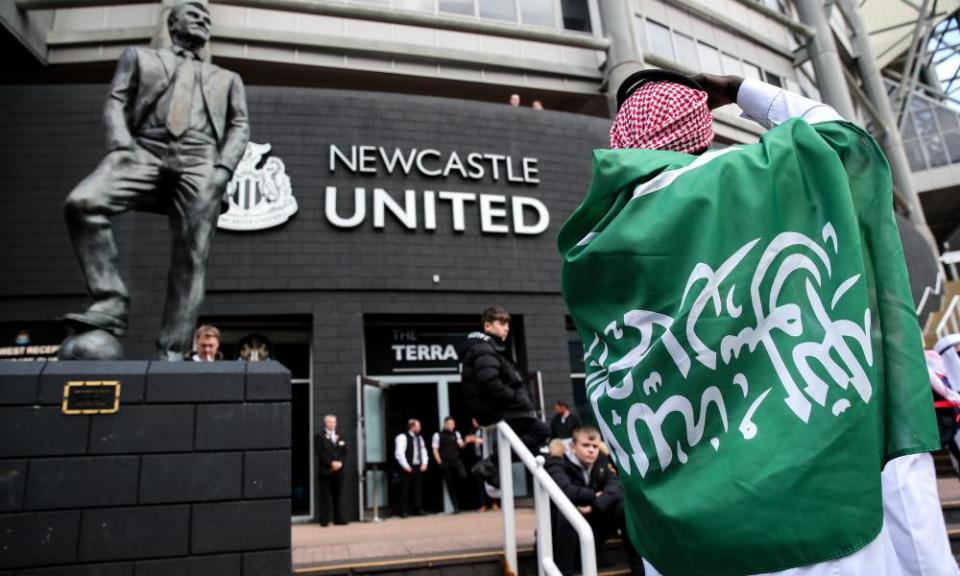Crouch review offers hope that English football will finally change for the better

There are still no guarantees of success but the creation of an independent regulator could finally hold clubs to account
It is a mark of the instability of our times that the game of association football in England may have a chance of changing for the better.
That there is still no guarantee should go without saying. The fan-led review of football governance is hardly the first attempt by politicians to correct the course of the national sport. Whether all 47 recommendations complete the long journey into implementation is even more uncertain. But the fact that no one is writing it off on publication day makes for a pleasant change.
Related: Government’s fan-led review calls for Premier League clubs to pay transfer tax
The great expectation around the review has come in part because of the belief that, this time, it could be for real. There are a number of reasons for this, not least the identity of the chair. Tracey Crouch is a politician respected across parliament and throughout the game. She has led an inquiry that was thorough and inclusive. We’ll call it the Crouch review from here.
Another big reason is quite the pickle that English men’s football finds itself in. It has never been more popular nor more lucrative, yet barely any of its clubs are profitable, its divided governance is commonly ineffectual and its cultural clout means every misstep is a national incident.
The game has had a long time to sort itself out and has failed to do so. Even the heightened circumstances of the pandemic did not result in greater sustainability or a more even redistribution of resources. Instead we got the European Super League. It was in response to this plutocratic wheeze that the government finally turned a delayed manifesto promise into reality. Something had to be done and so here we are.
The proposal that underpins the Crouch review has been widely trailed: the creation of an independent regulator for English football. The IREF would have two primary responsibilities, one financial, one corporate. It would demand financial plans from a club’s owner and would be able to inspect the books at any point. It would also be able to make greater demands of the owners themselves, including asking that they pass an integrity test and resubmit to assessment every three years (as opposed to the current one-off criminal record check). Should any of the agreed criteria not be met, the IREF could revise the terms under which any club was allowed to compete or remove that right.
That’s a big change. The IREF would be like Ofcom, licensed by government but not run by it. It would not be controlled by the current powers of the game, and there is an interesting paragraph or six in the review about why the Football Association has not been given control. Crouch wants to get a “shadow” regulator up and running as soon as possible, even before the formulation of legislation, to hit the ground running (and perhaps prevent any drain on momentum).

The IREF has, it is understood, won government approval. It is far from the only structural change suggested by the review. There are some populist measures that suit the political times: a golden share for fans to veto certain changes at their club (the colours, for example, or the sale of the stadium) and a trial that would allow League Two fans to booze in the stands. There is more gritty stuff too, particularly when it comes to financial imbalances.
The Crouch review looked at a number of ways of controlling costs, including wage caps, and largely decided against them. Instead it argues for a “prudential” approach to funding. The details are to be left to the IREF to devise but, just like a bank in a stress test, clubs will be expected to have enough capital and liquidity at all times to ensure their ongoing operation.
On the issue of owner injections, the cash that often causes competitive imbalance but equally keeps a number of clubs alive, the Crouch review argues that it should be proportionate to a club’s current finances, a solution that will benefit bigger clubs, but only if they have the money in the bank.
On parachute payments, the issue the EFL believes to be the most iniquitous in football, the Crouch review has stepped back. It will be for the Premier League and the EFL to work out something between themselves “with compromises on both sides”. They have until the end of the year, after which the review recommends independent advice. If that doesn’t work, the IREF will work something out for them.
“Eyes on the prize” has been the slogan of fans groups, who would now have actual – if limited – control over clubs. For the FA, there is a need for reform with the prospect of greater control in future. For the EFL, sustainability is on the table at last, if not currently the redistribution it is looking for.
As ever, what the Premier League thinks is both most important and least discernible. Its statement welcoming the review took care to acknowledge that issues needed addressing, particularly “to restore and retain [fans’] trust in football’s governance”. But there were warnings too that “any reforms do not damage our game”.
The Premier League may be riven by rivalry among its shareholders, exemplified by the Saudi-led takeover of Newcastle, but it has dominance over English football. The Crouch review would diminish these powers, while taking some of its greatest challenges off its hands. How it responds will be of interest. The Crouch review is a reality, but the politics is not finished yet.

 Yahoo Sport
Yahoo Sport 





































